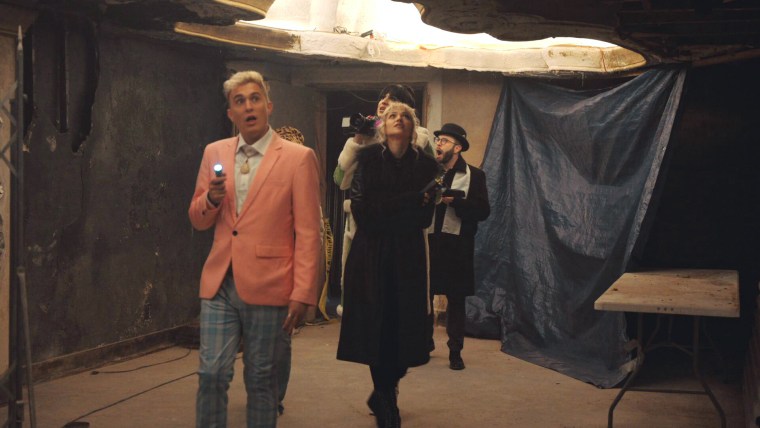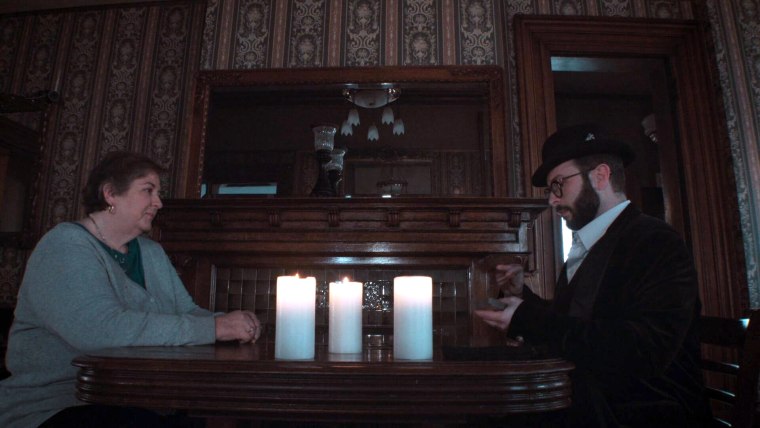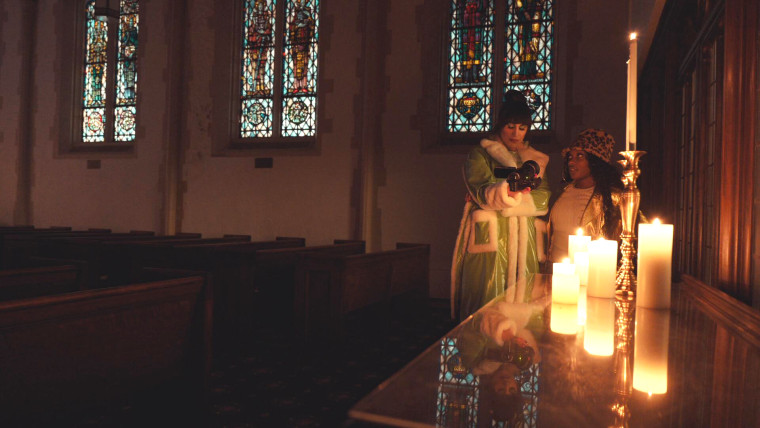Thanks to reality shows like the long-running “Ghost Hunters” series, which aired its 16th season this year, paranormal work has had a particularly heteronormative image for the last few decades. But the new, cheekily named Hulu series “Living for the Dead” — which is narrated and executive produced by Kristen Stewart — is serving up supernatural storytelling with a different kind of hair-raising look, courtesy of its five fabulous ghost-hunting stars.
Emmy-winning “Queer Eye” producer Rob Eric, who serves as an executive producer on “Living for the Dead,” recalled initially being approached about the idea.
“A call was made to us that said Kristen Stewart wanted to talk about a show idea, and she got on and said, ‘Wouldn’t it be fun if we could do something different, like gay ghost hunters?’ And we were like, ‘Gay ‘Scooby-Doo’?! We’re in,’” Eric said during a junket with the cast, ahead of the full season release Wednesday.
In the series, the queer ghost hunters take a road trip across the country, hitting the scenic highways of the American Southwest and weaving their way up to the Great Lakes region, to make overnight visits at eight allegedly haunted locations. Armed with an array of skills — including psychic sense, witchy ways and equipment expertise — the paranormal professionals give the spaces a kind of spiritual glow up by communing with the ghosts that haunt their dwellings and the living that inhabit them.
Some of the locations, like a sprawling former sanatorium in Kentucky called Waverly Hills and the Lemp Mansion in St. Louis, are apparently well known in the paranormal community. But others, like a modern Arizona mansion with a cagey young owner and a Las Vegas strip club overseen by a protective matriarch, are more off the ghost-hunting grid. But they’re all, according to the show’s stars, verifiably infested with otherworldly beings.
“Honey, there were no duds! They made sure where they sent us was haunted as can be,” Logan Taylor, the show’s resident psychic, said. “I remember, by the very end of it, I would go to bed at night just completely used to hearing screaming — blood-curdling screaming as I’m trying to sleep.”
Alex LeMay, the group’s tech guru, agreed.
“They were very, very, very haunted and very active, and it never stopped, even when the cameras weren’t rolling,” LeMay said, citing eerie disturbances like things being thrown in the middle of the night. “I think it would turn any skeptic into a believer, just staying one night at some of the places we investigated.”

Like the rest of the group — which is rounded out by Juju Bae, a self-described witch, and Ken Boggle, a tarot card specialist — researcher Roz Hernandez has worked in the paranormal field for years. But she said that staying put in the locations overnight proved challenging between all the foot tickling and other invasive activity going on in the wee hours.
“The ghosts did not clock out because the cameras weren’t rolling. They were there to play with our toes or do whatever they wanted to do, and I hated it,” she said in response to her castmates teasing her about trying to sneak away to hotels in the middle of the night.
She said she’s been watching ghost-hunting shows for years and has “given them a lot of side-eye,” but now she can better relate to how unnerving visiting a series of well-researched, spooky spaces can be.
“I’ve been, like, ‘Come on, you mean to tell me, every place you go, there’s stuff happening?’ But it is sort of like a casting process. We have to make sure that these are places that truly are in need of an investigation, and they did not disappoint — any of them,” she said.
Though the group reportedly had a bevy of unsettling supernatural encounters during filming, their run-ins with the living residents of the haunted locations were much more to their liking. In several episodes, the “ghost hunties” — to borrow the series’ promo language — even take a break from engaging with spirits to have cocktails and a spooky kiki with the locals. During these rendezvous, the experts didn’t encounter much skepticism from their new friends, especially given that most of them had ghost stories of their own. But the out-of-towners were aware of not fitting the typical ghost-hunting mold.
“Listen, some of us prance into town with 6-inch heels on,” Hernandez said. “So you might be like, ‘What are these people going to achieve here?’ But we actually know what we’re doing, as much as you can when you’re talking about things that are unknown.”
To find the right people to represent the LGBTQ contingent of ghost hunters — which is smaller than one might think, according to Hernandez — the show’s producers used a casting approach they developed for the original “Queer Eye,” which premiered in 2003. Essentially, after whittling down thousands of applications to a smaller collection of finalists, they brought the top contenders to Los Angeles to watch how they interacted with each other off-camera and to test out their skills.
“One of the most important things about casting is to not always be in the casting, but to rather step back a little bit from it and see who’s talking to each other when they’re not on camera — who’s vibing,” Eric said.

Once the in-person casting began, the producer added, he and the rest of the team could see their group of stars beginning to form, and then, during one-on-ones when the interviewees were asked to show off their ghost-hunting talents, their final five pulled away from the pack. While Bae was eliciting gasps from one part of the room, Boggle gave Eric a “terrifyingly accurate” tarot card reading. And in a more secluded space, Taylor channeled the deceased father of Eric’s co-producer, “Queer Eye” creator David Collins, recalling a private moment between father and son.
“David came out of a room crying — couldn’t stop crying, and we’re like, ‘Yeah, this is the team. We did it,’” Eric said. “You can see it. They come together so beautifully in the show. It just feels like they’ve known each other forever, and, who knows, maybe in past lives, they did.”
Without the benefit of a live demonstration, some viewers may have a harder time believing in the experts’ skills — and buying into the series as a whole, which takes its supernatural encounters very seriously. Though, Eric and his co-producers attempt to bridge that gap by showing the cast performing the practical aspects of ghost hunting, much like the stars of “Queer Eye” tackle the various elements of a makeover.
“If we just had you assume that this is what Juju does to get rid of spirits, and we don’t tell you what that is, or what Ken does to contact spirits, you wouldn’t believe them. If you didn’t see JVN cutting hair, and we just showed you the final product, you’d be, like, ‘Well, wait a minute, who cut the hair?’” Eric said, referring to “Queer Eye” grooming expert Jonathan Van Ness.
Eric acknowledged that a reality series about “the woo woo,” as Bae and some of the cast amiably described paranormal work, may not be everyone’s cup of tea. But he also said that seeing people commune with ghosts isn’t entirely the point. Instead, like their “Queer Eye” counterparts, it’s witnessing the experts’ particular brand of empathy — not to mention their obvious fabulousness.
“The paranormal can be very divisive in terms of, ‘Oh, I don’t watch that, because it’s paranormal,’ or, ‘I watch it because it is paranormal.’ This show you should watch because the characters are so interesting,” Eric said.
